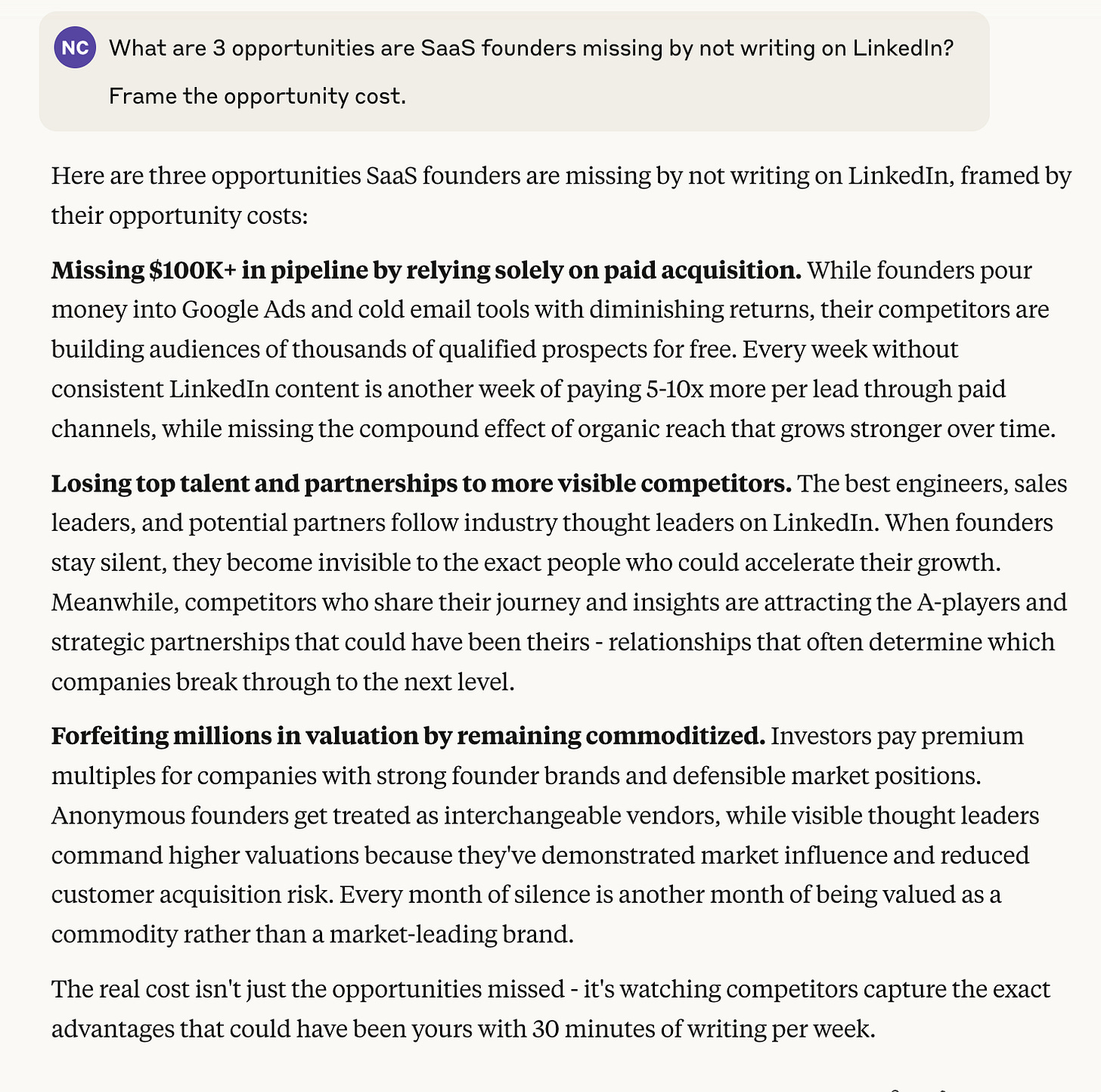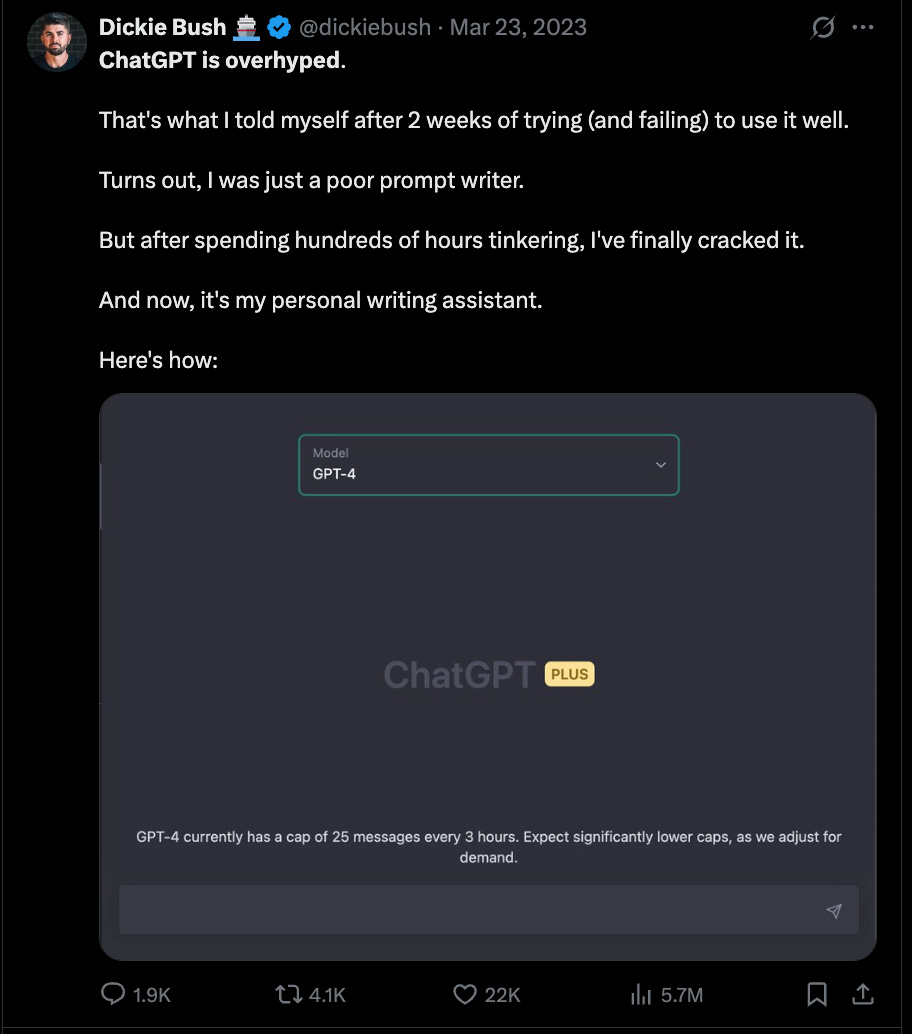Hey there!
The best writers don't use AI to create ideas—they use it to expand the ideas they already have.
If you know the right prompts, you can take any topic you understand and develop it into content that's deeper, more useful, and more engaging than what you'd create on your own.
Today I'm sharing 5 prompts I use to help me expand my writing with AI.
Let's start with the most powerful psychological trigger in persuasion:
Prompt #1: Highlight a missed opportunity
This prompt helps you expand any basic advice into urgent, actionable content.
Instead of just saying "here's what to do," you can expand what happens when people don't take action—giving you more angles to write about and stronger reasons for readers to care.
Here are a few prompts to frame the opportunity for your reader:
What opportunities is [target audience] missing by not [specific action]?
What’s [target audience] leaving on the table by sticking with [current approach]?
What competitive edge is [target audience] giving up by avoiding [specific strategy/tool/approach]?
Example:
Including opportunity cost gives your writing more urgency, makes your argument sharper, and forces the reader to imagine what they’re losing by staying the same.
Prompt #2: Position a fix as an expert insight
This prompt helps you leverage other (well-known) people your target audience is likely to recognize and trust in order to bring more attention to your writing.
You can do this in two ways:
Borrow their advice
Borrow their stories
You want to tell the reader who the real expert is and how you went out and curated the very best of their work.
Here are a few starting prompts to help you expand your writing with an expert opinion:
“Act like [person/role], recommend a fix for [specific challenge].”
“What advice would a [role/person] about [problem]?”
“Tell me about a time when [expert] solved [problem].”
The more specific you are about the expertise you want, the stronger and more authoritative the response will be.
Prompt #3: Propose a quick, easy-to-follow solution
Everyone wants a shortcut.
Why? Because simple steps eliminate confusion, prevent costly mistakes, and turn overwhelming challenges into manageable tasks that ultimately save your reader time.
These prompts will help you break down any problem into a simple guide:
“Propose a quick, easy-to-follow solution for [problem]”
“Give me a step-by-step roadmap to [result] for a beginner.”
“Break [task] down into 25 steps with the first one taking less than 5 seconds.”
Every problem feels smaller once you’ve broken it into steps.
Prompt #4: Use a relatable metaphor to emphasize the point
Let's say you're trying to explain how memory works to a 5 year old.
You could tell them memory is how your brain takes in information, keeps it, and brings it back when you need it. It’s accurate. But there’s a good chance the child will have no clue what you mean.
Now imagine you pull out a metaphor:"Your brain is like a huge toy box. Sometimes you can find your favorite toy right away, and sometimes you have to dig around for it."
Suddenly the child lights up because they can relate to finding their toys.
A good metaphor helps your reader connect new concepts to things they already know. Which means they can focus on learning the new idea instead of struggling to understand your explanation.
Click for a prompt to help you make your instantly more relatable.
Prompt #5: Challenge a common thought with a polarizing statement
A lazy brain is a writer's enemy.
When everything around you agrees with what you already think, your brain gets lazy. It goes "Yeah, yeah, I know this stuff" and moves on. But disagreement wakes it up. Challenge the reader and suddenly they're asking "Is this true? Why do I disagree? What if they're right?"
Here are a few prompts for you to try:
"List 5 commonly accepted belief in [industry/niche]. Challenge each one with a polarizing statement."
"What would happen if [target audience] did the exact opposite of what experts recommend for [specific situation]?"
“What’s a piece of conventional wisdom in [niche] that costs people money, time, or status?”
An engaged brain even one that's arguing with you) is paying attention. And attention is the first step to influence, learning, or change.
That’s it.
Chat soon,
—Dickie & Cole
Co-Founders of Ship 30 For 30
Co-Founders of Premium Ghostwriting Academy
Co-Founders of Typeshare
Co-Founders of Write With AI
What did you think of today’s newsletter?
❤️ Loved it. Refer it to a friend or drop a 🙌 below.
🫤 Meh. You can unsubscribe here. Or manage your subscription here.
🥳 I’m new here. Welcome! Grab these 3 resources to get started writing with AI.
🤩 Give me more. Check out reader favorites here (and all our free & paid products here).





